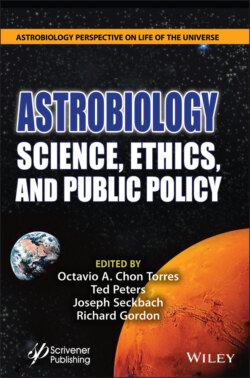Читать книгу Astrobiology - Группа авторов - Страница 25
2.2.2 Second Foundational Question: What Do We Value?
ОглавлениеLife. Like cream in ol’ fashioned milk bottles, life floats to the top of the astrobiologist’s value bottle. “I suggest that the long-term goal for astrobiology and society is to enhance the richness and diversity of life in the Universe,” avers NASA’s Christopher McKay [2.47].
No one debates whether or not to value life. Yet, just how we value life has become a quandary. “Whether secular or theological, the most important question about the foundations for ethical value turns on the distinction between intrinsic value—value independent of a valuing agent—and instrumental value—value in relation to something else like the needs of humans” [2.26]. Steven Dick, former holder of the Baruch S. Blumberg NASA/Library of Congress Chair in Astrobiology, turns on this distinction to develop a cosmocentric ethic. The cosmos has intrinsic value, concludes Dick. Or, perhaps more modestly, a cosmocentric ethic will stretch the scope of terrestrial human valuing beyond anthropocentrism or even geocentrism to incorporate extraterrestrial life in both microbial and intelligent forms. Dick’s cosmocentric ethic “establishes the universe and all or part of its life as a priority rather than just humans or even terrestrial life in general” [2.26]. Where Dick puts cosmocentrism, I put the galactic common good.
Is it possible for anthropocentric and geocentric earthlings to transcend their own myopia? Yes, according to astrotheologian Andreas Losch, “We cannot avoid some anthropocentric bias, but we humans are also the ones who can speculate beyond the bounds of our experience” [2.41]. The shift toward a galactic or even cosmocentric perspective will require a realistic respect for the tension existing within our human nature: our proclivity toward self-centered myopia in tension with our capacity to speculate broadly and altruistically.
Dick’s proposal of a cosmocentric ethic—in conjunction with my proposal for a galactic common good—compels us to ask: What do we already value? Do we actually value the safety, welfare, and future health of Planet Earth? Our ecoethicists say, no. They complain bitterly that de facto the human race values its home planet too little. Even with enlightened self-interest as a motive, we planetary citizens have befouled our terrestrial home. One might reasonably ask: If we terrestrials have befouled our own planetary nest, might we do the same for every off-Earth site we visit? [2.9].
Geocentric values are constantly assaulted by rival greeds. Even high-minded Enlightenment values—freedom, equality, justice, dignity, peace—are left orphaned by the vicious competition for economic survival if not domination. Arnould, using the metaphor of evolution, fears that what has happened on Earth may be repeated in space [2.4] [2.5]. The human attitude of domination of the fittest (or, sometimes also, of survival) leads to growing terrestrial pollution, toxic waste, even climate change which will modify, in a few decades, the level of the oceans, the rain pattern, the distribution of the deserts and the cultivatable zones.
To avoid the same polluting of space with earthling myopia, Arnould draws on the equivalent of intrinsic value and proposes that we “santuarize” outer space. By recognizing that space “transcends all our actual economic motivations …. It is probably the role of national and international space agencies to devise and introduce rules of effective control, and create conditions that would govern any form of exploitation still to come from space” [2.2]. In short, Arnould recommends that, by “sanctuarizing” space, our policy-setting transcends the vested interest of nations and businesses.
If “sanctuary” here connotes precedents already set on Earth for wildlife sanctuaries or protected parks, then I concur that setting a policy of sanctuarization of space would be consistent with our fundamental values. Yet, it could mean more. It could imply communion between what is natural and what is distinctively human; and this communion spawns moral power. Ecoethicist Cynthia Moe-Lobeda testifies how “human moral power flows primarily from deep communion between God, human creatures, and the broader community of life” [2.51]. Or, “the sacramental communion—God incarnate in us and among us as human communities and as a planetary or even cosmic community of life—is a locus of moral power” [2.51]. In a moment I will lift up the concept of a “galactic commons,” one way in which such values can empower us and lead to policy formation.
